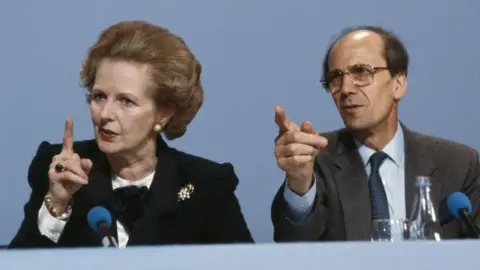**Norman Tebbit: A Legacy in British Politics**
Norman Tebbit, a prominent figure in British politics and a respected cabinet minister during Margaret Thatcher’s government, has passed away at the remarkable age of 94. Tebbit served in various significant roles throughout the 1980s, including as the chairman of the Conservative Party, and held crucial positions in departments such as trade, industry, and employment. His contributions to the political landscape, characterized by a staunch alignment with Thatcher’s policies, have solidified his legacy in the annals of British history.
A loyal supporter of Thatcher, Tebbit was instrumental in implementing sweeping reforms targeting trade unions. At the forefront of these efforts was the introduction of legislation that not only limited union power but also made unions liable for damages in cases of illegal actions. This marked a significant shift in labor relations in the United Kingdom, showcasing Tebbit’s commitment to modifying the political landscape in accordance with Thatcher’s agenda.
One of the most harrowing experiences of Tebbit’s life occurred in 1984 when he and his wife sustained injuries from the IRA bombing of the Grand Hotel in Brighton during the Conservative Party’s annual conference. This brutal attack left a lasting mark on both their lives—Tebbit suffered severe physical injuries, including a broken shoulder blade, fractured vertebrae, and a cracked collarbone, while his wife, Margaret, was left with permanent disabilities as a direct result of the bombing.
On July 7, 2025, it was confirmed that Lord Tebbit peacefully passed away at home. His son, William, issued a heartfelt statement requesting privacy for the family during this difficult time and indicated that further details regarding the funeral arrangements would follow soon.
The political community has reacted with an outpouring of tributes in memory of Lord Tebbit. Conservative leader Kemi Badenoch referred to him as an icon of British politics, acknowledging that his death would resonate with individuals across the political spectrum. Similarly, Lord Michael Dobbs, who served as Tebbit’s chief of staff, reflected on his remarkable character and political wit, praising his immense courage both in political matters and in his personal life, especially following the trauma of the Brighton bombing. Dobbs noted the immense void left by figures like Tebbit, who embody a strong commitment to their beliefs.
Margaret Thatcher’s biographer, Lord Charles Moore, echoed these sentiments, describing Tebbit as a quintessential representation of Thatcherism—an individual who rose from humble beginnings to become a prominent political figure, unashamed of his working-class roots. His journey from MP to cabinet minister underscored not only his political acumen but also his deep connection to the constituents he served.
As a Member of Parliament from 1970 until his retirement in 1992, representing Epping for a brief period and then Chingford until the end of his tenure, Tebbit was known for his outspokenness on various issues. He delivered a memorable speech during the Conservative Party conference in 1981 where he admonished those who participated in riots over unemployment, contrasting their actions with his father’s determination to find work during the 1930s. Tebbit’s assertion that one must take initiative serves as a testament to his belief in resilience and hard work.
However, his time in the political arena was not without controversy; in 1990, he notoriously posed what he termed a ‘cricket test’ to gauge someone’s British identity, an assertion that drew significant backlash for its controversial implications regarding race and nationality. His comments regarding the cricket test highlighted the often fraught discussions around national identity that continue to resonate in contemporary Britain.
In conclusion, Norman Tebbit’s life and political career reflect the complexities of British politics during the late 20th century. His commitment to his principles and policies, as well as his personal fortitude in the face of tragedy, will mark his place in history as a significant, if sometimes contentious, figure in the evolution of conservative politics in the United Kingdom.











